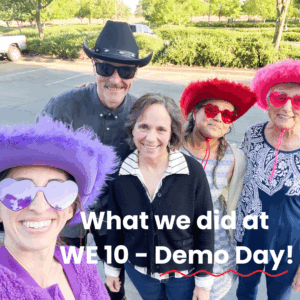Trust-Building Behavior #7 – Get Better
Why it Builds Trust
“Get better” means to constantly improve; to always be in a state of learning and openness to new ideas. Why does this build trust? When people experience you as always reaching for what is next and always searching for answers and new ways of doing things, they will be more confident in your ability to succeed.
This is particularly true in business relationships. Customers want to know that when you don’t know what to do, you will go find out; that you are open to finding new solutions that you do not already know of.
In personal relationships, this also builds confidence. When your spouse and your children observe that you are always asking questions of yourself and seeking answers, what they know is you are open. You are not looking at situations as fixed and only capable of one possible answer (yours). When you are open to learning, you listen more to others, whether it is your spouse or your children. And people feel more trusted and more trusting when they hear you asking their opinion; and when they experience you listening to their ideas. This is fostered by your continuous search for more learning from whatever source possible.
If you believe you can simply stay where you are and rest on what you have learned in the past, this will not build trust and confidence in others. One of my mentors, Lou Dozier, says that we human beings have two gears — forward and backward. There is no neutral. If you are not moving forward, then you are moving backward.
In the business world this is true in part because the speed of the rest of the world is so great that you think you are still in one place but compared to the rest of the business world, it is as if you are moving backward.
In personal life this is true as well. We have deeply engrained habits and ways of being. They can absolutely change and yet, if we stop working on them often the older habits begin to seep back in and we drift back in the direction from which we came.
Take a moment right now – stop, and bring to mind one person you know who you consider a life-long learner. Consider the level of trust that you have in them. Really stop and reflect on this for a moment. What is the level of trust you have in that person? Why is it at the level it is? Often life-long learners are willing to say when they are wrong, because they are always looking for what is next. Admitting mistakes builds trust as well.
What it Doesn’t Mean
Do not mistake academic learning for this trust-building behavior. This behavior is about getting better – improving ourselves. There are some who are constantly in the academic mode of learning, but never take action on what they are learning. This type of learning, akin to staying in college for major after major, but never going out and producing results based on your education, does not build trust and in fact will diminish it. Learning, like self-awareness, without action, is worth very little in the area of trust. And it tells people that you are not serious about making change and improvement.
What it Does Mean
The Japanese call this concept it kaizen. Tony Robbins calls it CANI – Constant and Never-Ending Improvement. The kaizen method is one of continuous incremental improvements and was originally a Japanese management concept for gradual, continuous change/improvement. It is a way of life philosophy assuming that every aspect of our lives deserves to be constantly improved.
Here’s a simple test – are you making mistakes? If not, you may be playing too safe to be truly improving. As Ms. Frizzle says, “Take chances, make mistakes and, GET MESSY!” (From Scholastic’s, Magic School Bus.)
Action Steps
Take a moment now and ask these questions:
- What are the areas that are most important for me to improve? (Business? Family life? Other relationships? Personally?)
- Where am I sitting still (i.e., moving backward)?
- What can I do to improve in this area?
- Take action every day to improve yourself.
How To
There are various ways to “get better.” I will here recommend three and you will surely invent your own.
1. Get Educated
Whether it is a formal class, a book you read alone, or a book discussion, the daily newspaper or an expert’s blog, if it is relevant to your area, you will search it out and learn from it. Isolate your areas for improvement and then find the resource that will assist you in improving. Hiring a coach is also a powerful way to focus your energies on improvement in whatever area is important to you.
2. Seek Feedback
Many people find this frightening and it can be, but there are few ways that are more useful for determining how you are appearing to others, than seeking feedback. Feedback is the mirror that allows you to see if you have spinach in your teeth. Human beings do not see ourselves. We cannot. Many companies send out surveys. I ask for feedback by way of specific questions on my strengths and challenges, what worked and did not, of my coaching clients and my audiences when I speak. And the important second step of course — use the feedback! I change my talk. I change my style if it does not work for my client or my audience.
The most courageous feedback of all, I believe, is to literally ask your friends and associates this question: what are three things about me that you like the most and three things about me that you like the least. Asking this question allows us to let go of the image protection and simply get the truth. It will build trust that you are asking for the feedback and even more so when you use it!
3. Learn from your Mistakes
An NLP (neuro-linguistics programming) presupposition is, “There is no failure, only feedback.” All information can be utilized. My favorite example of this is Thomas Edison, who is reputed to have attempted to create the light bulb in the neighborhood of 100 times and he “failed” each time until the very last attempt, when he brought electric light to our world. Reportedly, when asked what it was like to fail that many times, he said, “I did not fail. I learned 100 ways not to make a light bulb.” This is to me the perfect example of the “get better” principle. He took his learning from every attempt and used it to improve. He saw his “failings” as feedback and an opportunity to learn, adjust and go again. He was willing to learn, rather than just get upset with himself or the circumstances. As a result he improved and improved until he accomplished what he intended. This is a mode that builds trust with others and particularly with oneself. When you know about yourself that you will learn from your mistakes and continue to improve, you can trust yourself not to give up. And this type of self-trust goes a long way to creating trust with others, and allowing us to improve ourselves and create our desired results.
With Yourself:
As stated, continuous improvement builds self-trust and confidence. Seeing what does not work as feedback to learn from also builds self-trust.
What new practice will you put in place this week to begin to constantly “get better?”







